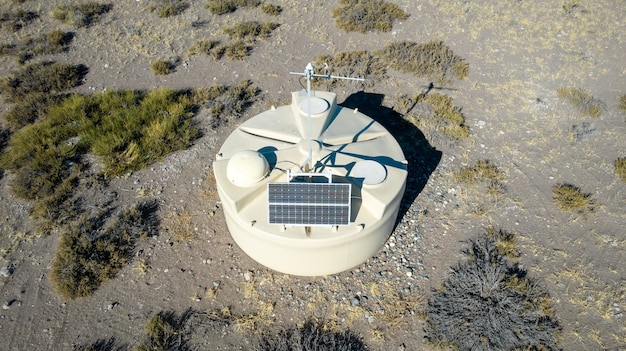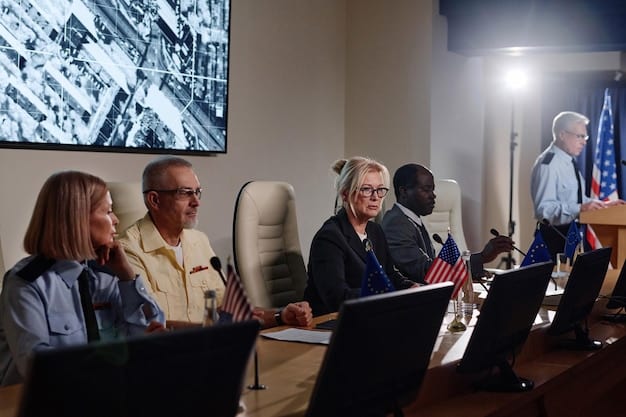The US Role in Addressing Climate Change & Sustainable Development

The US plays a pivotal role in addressing global climate change and promoting sustainable development through policy leadership, technological innovation, financial contributions, and international collaboration.
Navigating our global future requires a concentrated effort to combat climate change and foster sustainable development. The role the US will play in addressing global climate change and promoting sustainable development is crucial due to its economic influence, technological capabilities, and historical contributions to greenhouse gas emissions.
Understanding the Imperative for US Climate Action
The urgency of addressing climate change and promoting sustainability cannot be overstated. As one of the world’s largest economies and historical emitters, the US has a profound responsibility to lead global efforts. This leadership is essential not only for mitigating environmental risks but also for fostering economic opportunities in green technology and sustainable practices.
Furthermore, climate change poses significant threats to the US itself, from increased frequency of extreme weather events to rising sea levels impacting coastal communities. Investing in sustainable development ensures long-term resilience and economic stability for the nation.
The Scientific Consensus on Climate Change
The overwhelming scientific consensus confirms that human activities, primarily the burning of fossil fuels, are driving climate change. Reports from the Intergovernmental Panel on Climate Change (IPCC) detail the far-reaching consequences, including rising temperatures, altered precipitation patterns, and increased atmospheric carbon dioxide levels.
Economic Costs of Inaction
Ignoring climate change carries significant economic costs. These include damages from extreme weather events, disruptions to agriculture, increased healthcare costs, and potential declines in industries dependent on natural resources. Investing in mitigation and adaptation measures is economically prudent and can stimulate innovation and create new jobs.
Beyond national interests, the US commitment to addressing climate change is pivotal for global stability and security. Climate-related disasters can exacerbate existing social and political tensions, leading to displacement, conflict, and humanitarian crises, which have ripple effects across international relations and global economies.
- 🌡️ Rising global temperatures and extreme weather events.
- 🌊 Sea-level rise threatening coastal communities.
- 🌱 Impacts on agriculture and food security.
- 💰 Economic costs of climate-related disasters.
In conclusion, the imperative for US climate action is driven by scientific evidence, economic necessity, and global responsibility. Addressing climate change is an opportunity for the US to lead in technological innovation, sustainable development, and international cooperation, fostering a more resilient and prosperous future.
Policy Frameworks and Commitments
US policy frameworks are essential in steering climate action and sustainable development. These policies dictate the country’s strategies, investments, and international commitments. The current administration’s policies represent a significant shift toward more sustainable initiatives, marking a departure from previous approaches.
Effective policy frameworks are vital for creating a regulatory environment that incentivizes sustainable practices in industries, encourages investments in green technology, and holds polluters accountable. These frameworks must be robust, flexible, and adaptable to evolving scientific understanding and technological advancements.

The Paris Agreement and US Re-Engagement
Rejoining the Paris Agreement signaled renewed US commitment to global climate action. Under the agreement, the US has pledged to reduce greenhouse gas emissions significantly by 2030. Achieving these targets requires transformative changes across various sectors, including energy, transportation, and agriculture.
Key Domestic Policies and Initiatives
Domestically, several policies and initiatives are underway to support climate goals. These include investments in renewable energy infrastructure, incentives for electric vehicle adoption, and regulations to reduce emissions from power plants and industrial facilities. The Bipartisan Infrastructure Law and the Inflation Reduction Act include billions of dollars for climate-related projects.
- 🤝 Recommitting to the Paris Agreement targets.
- 💰 Investing in renewable energy infrastructure.
- ⚡ Incentivizing electric vehicle adoption.
- 🏭 Regulating emissions from industrial facilities.
To summarize, US policy frameworks and commitments play a critical role in addressing climate change and fostering sustainable development. These policies not only guide domestic actions but also influence international cooperation and set an example for other nations to follow in transitioning to a low-carbon economy.
The US Role in Global Climate Finance
The US role in global climate finance involves providing financial assistance to developing countries to support their efforts in mitigating and adapting to climate change. These contributions are essential for enabling developing nations to transition to cleaner energy sources, build climate-resilient infrastructure, and conserve natural resources.
International climate finance is a crucial component of global climate action, as it supports developing countries, which often lack the resources and technology needed to address climate change effectively. Developed nations, including the US, have a historical responsibility to provide this financial support.
Bilateral and Multilateral Contributions
The US contributes to global climate finance through both bilateral and multilateral channels. Bilateral contributions involve direct financial support to specific countries or projects, while multilateral contributions are channeled through international organizations such as the World Bank and the Green Climate Fund.
Challenges and Opportunities
Despite the importance of climate finance, there are challenges in meeting the commitments made by developed countries. Ensuring that financial flows are adequate, predictable, and effectively utilized is a key priority. Opportunities exist for innovative financing mechanisms, such as green bonds and public-private partnerships, to leverage additional resources for climate action.

Effective allocation of climate finance requires transparent governance, robust monitoring and evaluation, and alignment with national development priorities. By addressing these challenges and seizing available opportunities, the US can significantly enhance its impact on global climate finance.
- 🌎 Providing financial aid to developing nations.
- 🤝 Contributing through bilateral and multilateral channels.
- 🌱 Supporting renewable energy projects abroad.
- 📈 Promoting transparent fund allocation.
In conclusion, the US plays a vital role in global climate finance by providing financial support to developing countries for climate mitigation and adaptation. Overcoming challenges and optimizing the use of climate finance are essential for achieving global climate goals and advancing sustainable development.
Technological Innovation and Green Technology
Technological innovation is essential for tackling climate change and fostering sustainable development. The US possesses a significant ability to drive technological breakthroughs that can transform industries, reduce emissions, and promote sustainable practices. Investing in research and development, supporting innovation ecosystems, and deploying green technologies are key strategies.
Green technologies offer solutions for reducing greenhouse gas emissions, increasing energy efficiency, and promoting the sustainable use of natural resources. The US can lead the way in developing and deploying these technologies, not only for domestic benefit but also for global impact.
Investing in Renewable Energy Research
Research and development in renewable energy technologies, such as solar, wind, geothermal, and energy storage, are crucial for reducing dependence on fossil fuels. Government funding, private sector investments, and public-private partnerships can accelerate innovation and drive down the cost of renewable energy technologies, making them more competitive with traditional energy sources.
Promoting Sustainable Agriculture Practices
Agriculture contributes significantly to greenhouse gas emissions through deforestation, fertilizer use, and livestock production. Promoting sustainable agricultural practices, such as precision farming, conservation tillage, and agroforestry, can reduce emissions, improve soil health, and enhance food security. The US can support the adoption of these practices through research, education, and incentives.
- ⚡ Developing renewable energy technologies.
- 🌱 Promoting sustainable agriculture.
- 🚗 Fostering electric vehicle technology.
- 🏢 Improving energy efficiency in buildings.
Overall, technological innovation and green technology are vital for achieving climate neutrality and fostering sustainable development. The US ability to drive innovation, develop and deploy green technologies, and promote sustainability through these efforts can have a transformative impact on the global economy and the environment.
International Collaboration and Diplomacy
International collaboration and diplomacy are critical for addressing climate change, as climate challenges transcend national boundaries. The US role in fostering cooperation, negotiating international agreements, and engaging with other nations is essential for achieving global climate goals.
Effective international collaboration requires strong diplomatic leadership, mutual respect, and a shared commitment to addressing climate change. The US can leverage its influence and expertise to facilitate partnerships, promote knowledge sharing, and overcome barriers to climate action.
Engaging in Climate Negotiations
The US plays a key role in international climate negotiations, such as the Conference of the Parties (COP) to the United Nations Framework Convention on Climate Change. These negotiations are essential for setting global emission reduction targets, mobilizing climate finance, and establishing rules for international cooperation.
Supporting Developing Countries
Supporting developing countries in their climate efforts is a crucial aspect of international collaboration. The US can provide technical assistance, capacity building, and financial support to developing nations, helping them transition to low-carbon economies and adapt to the impacts of climate change. This support is essential for achieving equitable and sustainable development.
- 🤝 Participating in climate negotiations.
- 🌍 Supporting developing countries’ climate efforts.
- 🤝 Encouraging global collaboration.
- 🌱 Promoting sustainable practices internationally.
In summary, international collaboration and diplomacy are indispensable for effectively addressing climate change. The US capacity to foster cooperation, negotiate agreements, and support countries in their climate efforts can significantly contribute to achieving global climate goals and promoting sustainable development worldwide.
Challenges and Opportunities for the US
Both challenges and opportunities exist for the US in its efforts to address climate change and promote sustainable development. Overcoming these challenges and seizing these opportunities is critical for positioning the US as a leader in the global transition to a sustainable, low-carbon economy.
Internal challenges include political polarization, economic restructuring, and technological barriers. Externally, the US faces challenges related to international cooperation and the need to balance its economic interests with its climate commitments. Successfully navigating these challenges requires innovative strategies and strong political will.
Political Polarization and Policy Consistency
Political polarization on climate change can hinder policy consistency and long-term planning. Building bipartisan support for climate action is essential for ensuring that climate policies remain stable and effective across different administrations. Promoting public awareness, engaging stakeholders, and fostering dialogue can help bridge the political divide.
Economic Restructuring and Job Creation
The transition to a low-carbon economy involves significant economic restructuring, as some industries may decline while others grow. Ensuring a just transition for workers and communities affected by these changes is crucial. Investing in retraining programs, promoting green jobs, and supporting economic diversification can help mitigate potential negative impacts.
- 🏛️ Overcoming political polarization on climate change.
- 💼 Ensuring a just transition for workers.
- 🧪 Addressing technological barriers to sustainability.
- 🌍 Balancing economic interests with climate commitments.
In conclusion, the US faces notable challenges and opportunities in its endeavors to address climate change and promote sustainable development. Overcoming political polarization, addressing economic restructuring, leveraging technological innovation, and fostering international cooperation are key to positioning the US as a global leader in sustainability.
| Key Point | Brief Description |
|---|---|
| 🌍 US Climate Role | Policy leadership, innovation, finance promote global sustainability. |
| 🤝 Int’l Agreements | US participation is crucial for global commitments and diplomacy. |
| ⚡ Green Tech | Innovation boosts emissions reduction, energy efficiency, sustainability. |
| 💰 Climate Finance | US contributions enable developing countries to adopt clean solutions. |
Frequently Asked Questions (FAQ)
▼
The main goals include reducing greenhouse gas emissions, increasing renewable energy usage, and promoting sustainable development practices. These goals aim to combat climate change and ensure a resilient economy.
▼
The US contributes through bilateral agreements and multilateral organizations. These contributions support mitigation and adaptation projects in developing countries, helping them transition to sustainable development.
▼
Technology is essential for developing renewable energy sources, improving energy efficiency, and promoting sustainable agricultural practices. Investments in R&D drive these technological advancements, supporting a low-carbon economy.
▼
International collaboration allows the US to negotiate agreements, share knowledge, and support developing countries. These collaborations are crucial for setting global standards and addressing transnational climate issues effectively.
▼
Challenges include political polarization, economic restructuring, and technological hurdles. Overcoming these challenges requires consistent policies, economic support for affected workers, and continued innovation in green technologies.
Conclusion
In conclusion, the US holds a significant and multifaceted role in addressing global climate change and promoting sustainable development. Through policy leadership, financial contributions, technological innovation, and international collaboration, the US can drive substantial progress towards a sustainable future. Overcoming challenges and capitalizing on opportunities will be key to realizing this potential, positioning the US as a global leader in climate action and sustainable growth.





